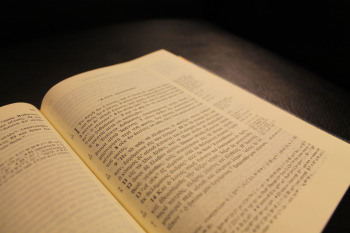"Do You Believe in the Son of Man?" -- John 9:24-41
 Tuesday, May 12, 2015 at 10:09AM
Tuesday, May 12, 2015 at 10:09AM  The Thirty-Second in a Series of Sermons on the Gospel of John
The Thirty-Second in a Series of Sermons on the Gospel of John
The people of Israel are deeply divided. Who is this man Jesus? Is he is a prophet? Should he be made king of Israel? Or, is he a false teacher and a danger to the nation? The Pharisees too are divided by the same question. Some of their number have accused Jesus of being a law-breaker and are plotting to kill him. Others have called him all sorts of horrible names. Still others have witnessed the miracles which Jesus has performed, and although they are not yet ready to become his disciples, they realize that only God can do such things. As for Jesus, he has declared that he is the Messiah and one with YHWH. When Jesus heals a man blind from birth on the Sabbath, the debate among the Jews heats up yet again. But in John chapter 9, a new and remarkable irony emerges. The man born blind can now see. But the religious leaders of Israel demonstrate that they are blind to the truth.
We are continuing our series on John’s Gospel, and we have come to John chapter 9, and the account of Jesus’ miraculous healing of a man who was born blind. This particular chapter of John (all 41 verses) is devoted to one miracle and the events which follow, but because we cannot do the passage justice by covering it in one week, I have broken the passage into two parts. Last time, we covered the first 23 verses of the chapter, today we will work our way through the balance of this remarkable, ironic, and tragic account of Jesus’ sixth miraculous sign, and the almost unbelievable events which transpire as a result.
Jesus’ healing of the man born blind very likely occurs shortly after the Feast of Booths (as we saw in John 7-8), when Jesus proclaimed that he was the light of the world–an assertion he repeats in verse 5 of John 9. As we have seen, John is very fond of irony, and we saw a fair bit of it last time when Jesus proclaims himself “light of the world” before instantly restoring sight (giving light) to a blind man. We also saw such irony appear again when Jesus (the one “sent” from God) “sends” the blind man to the Pool of Siloam to wash. The name Siloam is derived from the Hebrew verb “to send,” and Siloam was the same pool from which the Jews of Isaiah’s day refused to drink. The irony is that the Jews once again reject the blessings of God, which are evident when Jesus (the “sent one”) “sends” the blind man to the pool “of those sent.”
This particular miracle (the sixth of seven miraculous signs which are recorded in John’s Gospel) serves several very important purposes. The first purpose is that a number of well-known messianic prophecies in Isaiah’s prophecy, foretell that the coming of the Messiah will usher in an age in which sight will be restored to the blind (among other blessings). We saw this last time when we read a portion of Isaiah 35 for our Old Testament lesson. We read another of these remarkable prophecies in Isaiah 42. When Jesus restores sight (as he does throughout the synoptic gospels, and here in John) he is offering unmistakable proof that the messianic age has dawned in his person and work.
To read the rest of this sermon, Click Here


Reader Comments